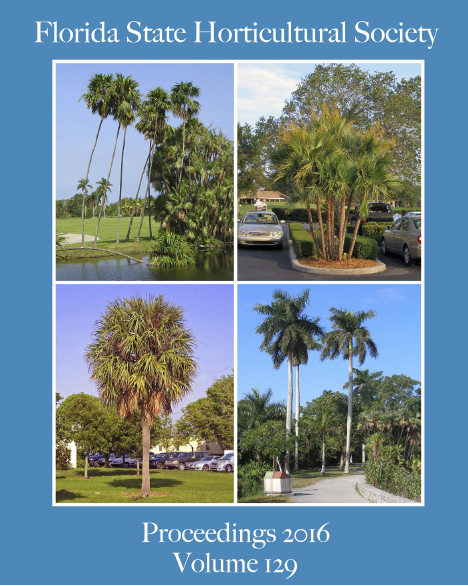The Effects of Postharvest Hot Water and Fungicide Treatments on Guignardia citricarpa Growth and the Development of Citrus Black Spot Symptoms on ‘Valencia’ Orange Fruit
Abstract
Citrus black spot (CBS), caused by Guignardia citricarpa, is a fungal disease that was first described in Australia in the 1890s and has since been discovered in Southwest Florida in 2010. The current study evaluated the effects of hot water treatments on mycelial growth of G.citricarpa in vitro and also evaluated postharvest hot-water dips and fungicide treatments on CBS development on ‘Valencia’ oranges. In vitro exposure to 568C for 120 seconds, 598C for60 seconds, or 628C for 30 seconds suppressed mycelial growth of all three G. citricarpa isolates by >30%. These treatments did not significantly reduce disease incidence or severity of CBS lesion development on whole ‘Valencia’ oranges from CBS-infected trees when the fruit already had visible CBS symptoms before treatment. On asymptomatic fruit, while the treatments did not significantly reduce the incidence of CBS lesion development, fruit dipped in568C water for 120 seconds significantly reduced disease severity after 2 weeks of storage compared with the control. None of the treatments caused peel scalding or fruit quality deterioration. Postharvest application of azoxystrobin, imazalil, or thiabendazole significantly reduced CBS disease severity on fruit that were asymptomatic at harvest, but did not affect disease incidence. These fungicides were not effective on fruit harvested later in the season(April), possibly because most lesion expression had already occurred before harvest, with little left to develop after harvest. On fruit showing CBS symptoms at harvest, postharvest fungicide treatments did not significantly affect disease incidence or severity after storage. Heating the fungicide solutions did not significantly improve fungicide effectiveness. These results demonstrated that fungicide azoxystrobin, imazalil, orthiabendazole could reduce CBS severity, but not incidence, on orange fruit that are still asymptomatic at harvest.

